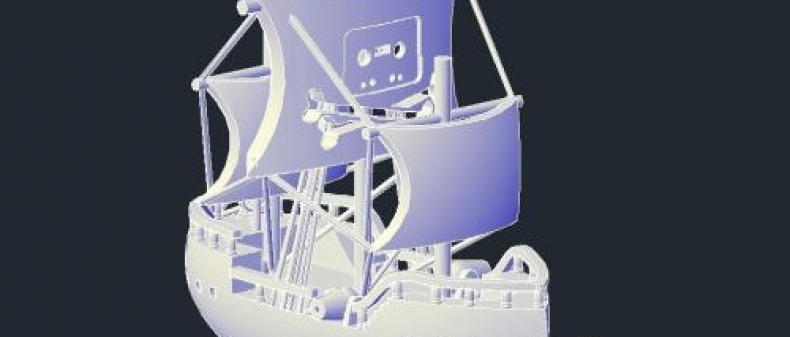
Since those lovable rapscallions at the Pirate Bay are known as much for their utopian, post-copyright whimsy as for being a bastion of piracy, then someone should give them some gold coins for their latest move, which–wait for it–wants to see people downloading physical goods.
If that sounds crazy that’s because it mostly is. It’s all a bit theoretical at the moment, but the Pirate Bay’s new “physibles” section seeks to spread digital 3D blueprints that people can, in theory at least, “print” at home, using 3D printing. If you’ve never heard of that before (and who would blame you?), 3D printers are machines that accept a blueprint for, say, a mug or a model car (or, as in this demo, a wrench), and then actually produce it using liquid plastics or by layering materials on top of one another. It isn’t quite like saying “Earl Grey, hot” as one would to the replicators from Star Trek, but it’s far out there stuff that will only get better and cheaper over time.
The Pirate Bay and their future-fancy visions are looking to push the idea into the public consciousness a bit. And good for them, ’cause it’s a funny, if slightly unsettling little concept that’s worth thinking about. After all, as local writer Tim Maly points out in a delightfully provocative set of ideas, the mass spread of 3D printing and digital plans enables a kind of “teleportation.” To wit, in a few decades from now, it may not be totally insane to say “Oh, do you like this purse? Here, let me email it to you.” (Depending on the purse in question, of course.)
Sure, it’s all vastly premature. But as Fast Company suggests, the very notions of property, both intellectual and physical, get upset if you can just download objects willy-nilly. Think about it: our economic system is largely based on the idea that, given our inability to create everything we need, we exchange currency in order to receive the things we need. If that becomes even slightly less necessary, you can see where this might go. Will high-end consumer goods still be desirable when there is no line between “authentic” and “fake?” Will labour still need to be outsourced when machines are cheaper than (uh, brown) people? How does capitalism, which is based on trading goods for money, even work when all you really need is a 3D printer?
But even if this is all totally impractical and far-fetched right now, it does point to the fact that the ambivalent revolutionary potential of digital is not simply in “how we consume music” or “look up facts,” but may actually be about our economic system and how we live our day-to-day lives. And how ironic is it that the end of capitalism might come about because of something you can print.
Navneet Alang is Toronto Standard’s tech critic. You can follow him on Twitter @navalang.
Subscribe to our newsletter.











